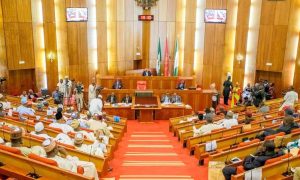The Monetary Policy Committee (MPC) of the Central Bank of Nigeria (CBN) is expected to hold its second meeting of the year on May 19th and 20th. Since the last MPC meeting, the global economic landscape has grown increasingly volatile and uncertain, primarily driven by persistent trade protectionist policies in the US.
In our view, the MPC is likely to take these developments into account, particularly the elevated global uncertainty and its adverse implications for naira stability, despite a positive real rate of return, given the current inflation rate. Against this backdrop, we expect the MPC to adopt a cautious stance, leaving the Monetary Policy Rate (MPR) unchanged, alongside retaining all other policy parameters in a bid to anchor inflation expectations and maintain the naira’s attractiveness.
US Trade Policies Heighten Global Uncertainty
Recent tariff hikes by the US administration have intensified global trade tensions, heightening economic uncertainty across both advanced and emerging markets. In response, central banks have adopted a cautious policy stance as they evaluate the potential impact of US trade measures on their domestic economies.
Specifically, the US Federal Reserve held its benchmark interest rate steady at 4.25%–4.50% for the fourth consecutive meeting in May, citing balanced risks between elevated inflation and rising unemployment. This decision comes despite ongoing disinflation—headline inflation eased by 10bps to 2.3% in April—and a contraction in economic activity, with Q1-25 GDP declining by 0.3% quarter-on-quarter.
Conversely, in response to mounting downside risks to growth and a continued decline in inflation, both the Bank of England (BoE) and the European Central Bank (ECB) have moved to ease monetary policy. The ECB reduced its main refinancing rate, deposit facility rate, and marginal lending facility by 25bps each in April, marking its third consecutive rate cut. Similarly, the BoE lowered its policy rate by 25bps to 4.25% at its May meeting, following a two-meeting pause.
Looking ahead, while de-escalation talks between the US and key trading partners— particularly the UK and China—have led to some tariff reductions, the persistence of broader trade restrictions continues to pose downside risks to global economic stability. In this context, US interest rates are expected to remain elevated, primarily due to high inflation risks. Meanwhile, the extent of policy easing across other advanced economies will hinge on the severity of growth deterioration stemming from ongoing trade frictions.
Domestic Economy Recovering but Risks Persist
Recent data from the Central Bank of Nigeria’s Purchasing Managers Index (PMI) indicates a sustained improvement in economic activity compared to the same period last year. The Composite PMI rose consecutively from 50.2 in January to 52.3 in March, before moderating slightly to 52.2 in April, with notable expansion across the services, agriculture, and industrial sectors.
This upturn is largely supported by stronger consumer demand and easing cost pressures. At the same time, domestic crude oil production has shown a modest recovery relative to 2024 levels, driven by enhanced pipeline surveillance and a gradual rebound in oil sector investment. Average crude output in Q1-25 stood at 1.67 mb/d (Q4-24: 1.63 mb/d; Q1-24: 1.54mb/d), with April production settling at 1.68 mb/d.
In light of these developments, we have revised our Q1-25 GDP growth forecast upwards to 3.62% y/y (previous: 3.43% y/y). Barring significant shocks, we anticipate that economic momentum will remain firm through the rest of the year, with full-year growth projected at 3.90% y/y.
Although the recent CPI rebasing has introduced a degree of uncertainty in interpreting current inflation trends, we believe price pressures have moderated compared to the previous year. This is primarily due to reduced naira volatility and slower energy price increases. However, consumer prices remain high, and the recent naira volatility is tilting inflation risks to the upside.
In the FX market, the naira has come under renewed pressure. Heightened global uncertainty stemming from the tariff war triggered capital outflows from foreign portfolio investors, further tightening FX liquidity. In addition, international oil prices declined amid expectations of softer global demand and OPEC and its allies’ decision to raise crude oil supply, amplifying concerns about Nigeria’s external earnings outlook and the sustainability of its FX reserves.
As such, the CBN increased its intervention in the FX market to meet the shortfall and curb excess naira volatility. Based on data from the FMDQ, CBN’s net inflow into the FX market in March and April reached USD2.61 billion, compared to the net outflow of USD928.40 million in January and February this year, when capital inflows were stronger.
The external reserves also fell to an 8-month low of USD37.80 billion in April on account of higher FX supply and debt service payments before increasing again to USD38.22 billion as of 12 May. On average, the naira weakened by 3.52% m/m to NGN1,579.80/USD in April from NGN1,524.27/USD in March. So far in May, the closing rate has hovered around NGN1,589.00/USD – NGN1,615.00/USD. Looking ahead, we believe risks to the naira’s stability in the near term are tilted to the downside given the persistent global uncertainty despite the ease in US trade tariffs.
Hold Rates Amid Uncertainty
Under the new CPI methodology, the current inflation rate suggests a return to positive real interest rates. However, challenges in interpreting inflation dynamics under the rebased CPI framework are likely to remain a key concern for the MPC. In our view, inflation risks are tilted to the upside, particularly as the naira continues to experience gradual depreciation, reinforcing the need to anchor inflation expectations.
Moreover, the MPC is expected to weigh the implications of heightened global uncertainty and the persistence of elevated global interest rates, which justify the need to preserve interest rate differentials and limit capital outflows. In this context, a rate cut—especially against the backdrop of weaker oil prices and fragile investor sentiment—could undermine foreign investor confidence. Accordingly, we expect the MPC to maintain a cautious stance by holding the MPR at 27.5% and leaving all other policy parameters unchanged.
Cordros



























